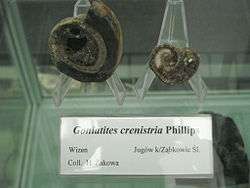Goniatites
| Goniatites Temporal range: from Late Devonian to Late Triassic, 409.1–205.6 Ma | |
|---|---|
| | |
| Fossil of Goniatites species | |
| Scientific classification | |
| Kingdom: | Animalia |
| Phylum: | Mollusca |
| Class: | Cephalopoda |
| Subclass: | Ammonoidea |
| Order: | Goniatitida |
| Superfamily: | Goniatitaceae |
| Family: | Goniatitidae |
| Subfamily: | Goniatitinae |
| Genus: | Goniatites De Haan, 1825 |
Goniatites is a genus of extinct cephalopods belonging to the family Goniatitidae, included in the superfamily Goniatitaceae. Beyrichoceras and Cravenoceras are among related genera.
Species
|
|
Description
The shell is generally globose with an open but narrow umbilicus, the surface commonly reticulate resulting from longitudinal lirae crossing transverse striae. The ventral lobe of the suture is rather narrow with a median saddle about or little less than half the height of entire lobe. The first lateral saddle is subangular to angular.
Distribution
Fossils of species within this genus have been found widespread in North America, Eurasia, and north Africa. In particular they have been found in the Triassic of Italy, United States, in the Permian of United States, in the Carboniferous of the Czech Republic, Germany, Ireland, Morocco, United Kingdom, United States, in the Mississippian of United States, as well in the Devonian of the Czech Republic, Spain, United States.[1]
Gallery

- Goniatites species from Morocco
References
- Miller, Furnish, and Schindewolf, 1957. Paleozoic Ammonoidea, Treatise on Invertebrate Paleontology, Part L. Geological Society of America.
- Genus Goniatites in GONIAT
- Sepkoski, Jack Sepkoski's Online Genus Database – Cephalopoda